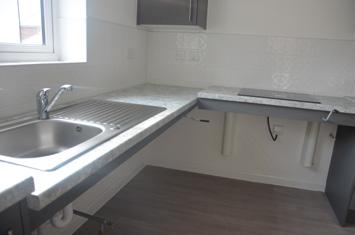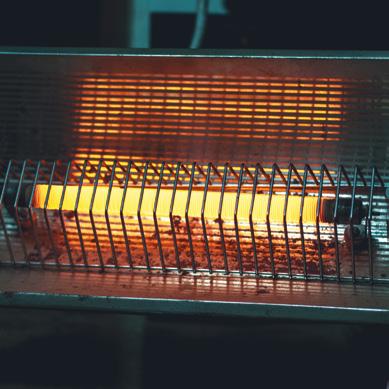








We recently took handover of three new specially adapted properties at our Strawberry Fields site in Gloucester.
The new homes have been specially designed to provide a comfortable living space for tenants with disabilities. They feature level access throughout, wider corridors, wet rooms and specially adapted ‘rise and fall’ kitchens as well as wheelchair storage and charging facilities.
In October, we welcomed Lydia and her family to their new home. This had been specially adapted to meet the needs of her family.
Working in partnership with Redcliffe Homes, Gloucester City Council and Gloucestershire Health and Care NHS Foundation Trust, we installed a through the floor lift in the home – a first for Two Rivers Housing.
Lydia explained the difference this will make to her family: “We feel very lucky to be moving into a new home that has been designed to make life with our disabled son so much easier.
“Now he can come home and be with his siblings and feel surrounded by his family. He will also be able to develop and engage with others as a little boy should. We are grateful and very humbled by the support we’ve been given and look forward to living in our new home.”
We’d like to welcome Lydia and her family to their new home and the Two Rivers Housing Community.
Building new homes is a crucial part of our promise to increase the availability of affordable homes in our communities. However, investing in our homes to make sure they continue to meet the needs of our tenants is just as important.
Many of our tenants stay with us throughout their lifetime and, as we move through life, our needs change. As your landlord, we provide an adaptations service that can help make sure your home continues to meet your needs.
Our adaptations team can help to ensure you can continue to live in your home comfortably and safely. Small adjustments like installing a grab bar, lever taps, and key safes can help make life a little easier. If you need these, you can contact our team on 0800 316 0897
Some tenants may need more substantial changes to their homes. This can include creating level access points, installing wet rooms or stairlifts and other changes to the property. If this is the case, you will need to speak to either Gloucester Social Care or the Herefordshire Council Advice and Referral Team.

The homes featured wet rooms, specially adapted rise and fall kitchen units and even a through the floor lift.


Experts from Occupational Therapy will look at your personal circumstances and decide what you need. They will contact us and then we will work with the relevant council to find out if funding is available for you and plan the work.
We are committed to making sure our homes meet the needs of our tenants and between July and September 2022 we made more than 60 adaptations to our homes to support our tenants.
Feeding the family on a budget can feel impossible, but with a little help you can make healthy nutritious meals that everyone will enjoy.
We’ve teamed up with Sunday Times Bestselling Author and local entrepreneur Grace Mortimer to provide three family and budget friendly meals. Grace creates hundreds of healthy nutritious meals, which she shares for free on her Instagram account. She even does the budgeting for you*, pricing each ingredient so you know how much you need before you get to the shops!
We’ve picked three to get your tastebuds tingling, and those tummies filled.
Ingredients
(prices sourced from Aldi)
500g frozen veg (40p)
1 tin of beans (26p)
4 x large baking potatoes (49p 100g Cheese (60p)
Total cost £1.75 which makes eight portions at 22p
Method
1. Turn the oven on to 200oC.
2. Peel and slice the potatoes into small chunks and boil them in water until they are soft.
3. Drain and mash them with a little butter and seasoning (if you wish).
4. Pour the frozen veg into a large oven proof dish.

1. Turn the oven on to 180oC
(prices sourced from Aldi) Half a pack of celery (14p) Tin of chopped tomatoes ( 1 x 500g packet of pasta (65p 250g beef mince (90p) 100g grated cheese (60p) Total cost £2.57, which makes eight portions at 32p each!
Method
2. Fry the mince in a frying pan to brown.
3. Roughly chop the celery and add to the browned mince. Fry for a
few minutes.
add that too.
5. Simmer until the sauce thickens then switch off the heat and allow to thicken further.
4. Add the tin of chopped tomatoes, then fill the tin with water and
6. Add a little of the cheese and stir in to melt. 7. Boil the pasta, drain and add it to the sauce. Mix well before transferring to an oven proof dish. 8. Sprinkle the rest of the cheese over the top and bake for 30 mins.

9. Enjoy!

Ingredients (prices sourced from Aldi)
4 sausages (74p)
1 tin of tomatoes (28p)
5. Spread the beans over the top and sprinkle on half of the cheese.
6. Spoon the mashed potatoes over the filling and sprinkle the rest of the cheese over the top.

7. Bake for 30 minutes at 200oC.
8. Remove from the oven and stand for five minutes to let the cheese crisp up.
9. Enjoy!
For more meal inspiration, follow _myfirstmeals on Instagram.
*Prices were correct at the time these recipes were produced.
1 swede (57p) 500g carrots (24p)
Total cost £1.83 which makes eight portions at Method
1. Peel and chop the swede and carrots and set them aside.
2. Chop the sausage into small chunks and fry until crispy. Remove from the pan and set them aside.
3. Add the chopped swede, carrots and tinned tomatoes to the pan and stir in two pints of boiling water.
4. Bring to the boil then simmer until the vegetables are soft. 5. Blend with a stick blender. 6. Add in the sausages and warm through.
7. Enjoy!
Sometimes things go wrong. Fires, burst pipes, and floods as well as vandalism and theft could cause damage to your home and your personal possessions. As your landlord, we purchase insurance to protect our homes against these risks however, this does not cover your home contents and personal possessions.
Your home contents and personal possessions could cost thousands of pounds to replace, so it is important that you consider how to protect them. One of the ways you can do this is by purchasing contents insurance.

Contents insurance covers the loss, accidental damage, and theft of your personal possessions.
We have worked with the National Housing Federation’s preferred supplier, Thistle Insurance Services, to offer a home contents insurance policy.
The National Housing Federation My Home Contents Insurance Scheme* is a pay as you go home contents insurance policy, which has been designed to meet the demands and needs of those living in social housing who wish to insure their possessions.
You can find more information about this product on our website: www.tworivershousing.org.uk/your-home/money-matters/ contents-insurance
Remember, before purchasing an insurance product you should ensure that it is right for you and covers your specific needs. If you are unsure, you should seek independent advice.
As part of our commitment to providing warm, safe affordable homes, we need to complete regular property surveys. This helps us ensure that the information we have on your home is up to date. It also gives us the opportunity to inspect the property and identify anything that needs urgent attention.
We do this through a ‘stock condition survey’. During the pandemic, we had to suspend this programme, but we will be inspecting all our homes over the coming months.
This is an inspection of the inside and outside of your home that is carried out by one of our surveyors. It is focussed on the core elements of your home such as the roof, windows, doors, kitchens, and bathrooms.
This does not necessarily mean we will be making immediate improvements to your home, but it will help us plan our long-term maintenance programme. So, it is important that you allow our surveyors to visit the property. We will write to you and let you know when our surveyors will be in your area. Due to the nature of the surveys, we are unable to provide a specific time slot, but you will need to be home for us to complete the survey.
*The National Housing Federation working in partnership with Thistle Insurance Services Ltd. Thistle Insurance Services Limited is authorised and regulated by the Financial Conduct Authority Firm Reference Number 310419. Registered in England under No. 00338645.
Registered office: Rossington’s Business Park, West Carr Road, Retford, Nottinghamshire, DN22 7SW. Thistle Insurance Services Ltd is part of the PIB Group. Our Data Protection Privacy Policy is online at www.thistleinsurance.co.uk/Privacy-Policy.
All our surveyors will have a Two Rivers Housing ID badge and they will present them before entering your home. If you want to check, you can call our contact centre on 0800 316 0897. They will be able to confirm if the person calling is a Two Rivers Housing team member.
Measuring our performance is key to helping us ensure we are delivering on our promises to tenants. Each year we work with an independent research company to gather feedback from our tenants.
We currently use the STAR methodology for our satisfaction surveys. This is a national set of questions that are used by housing associations across the country to gather feedback from tenants and measure the performance of their landlord.
The Regulator of Social Housing (RSH) has been looking at these measures alongside the charter for social housing residents. They want to make sure that landlords like Two Rivers Housing are measuring the right things and using the feedback from tenants to make positive changes to how they do things.
Over the last two years, the RSH has been working with tenants and landlords to create a set of measures that help tenants hold their landlords
to account. After considering all the feedback they received and prioritising which areas were the most important to tenants, the RSH published the final measures in September this year.
The new measures will come into effect from 1 April 2023 and all registered social landlords with more than 1,000 homes will need to collect information by 31 March 2024 before sending their results to the RSH.
We have already started making some changes in preparation for the new Tenant Satisfaction Measures (TSM) and will update you with more information in the Spring issue of Tenant Topics, as well as share results with you when they are available.
We always welcome feedback from our tenants and there are many ways you can get involved in helping to shape your housing association. You can find more information on some of the ways you can get involved on page nine of this issue of Tenant Topics.

We want to provide a great customer experience for all our tenants, but sometimes things do go wrong. If you need to make a complaint, you can contact us by phone, email, letter, on our website or in person.

We handle all complaints in line with our published complaints procedure, which is aligned to the Housing Ombudsman’s best practice guidance. Alternatively, you can raise your complaint with the Housing Ombudsman Service. You can contact them by email, telephone or by post.
E: info@housing-ombudsman.org.uk
T: 0300 111 3000
P: Housing Ombudsman Service, PO Box 152, Liverpool, L33 7WQ
Many of us will be looking for ways to save money this winter. As energy bills go up, you may want to find different ways to reduce the energy you use. Our Health and Safety Business Partner Jonny has provided some safety advice for some of the most common solutions.
Whether it’s a romantic evening, Christmas celebration or an alternative to switching on the lights, left unattended, candles can cause devastating fires. In fact, more than 50 house fires are started by candles every day!
A great alternative to candles is battery operated LEDs. These are brighter and much safer to use, but if you are using candles, please make sure:
• You never leave burning candles unattended.
• You place them on a stable surface out of reach of children and pets and away from flammable materials.
• You don’t move candles when they are lit.
• You don’t burn several candles close together this can cause the flame to flare.
• You burn candles in a well-ventilated room, away from draughts, vents, or air currents.
One of the most common energy saving tips is to turn off your lights – especially in rooms that you aren’t using. However, when you are moving around your home, good quality lighting is essential to help you avoid trips and falls. Always turn on your lights when moving around your home and, if you are using less lighting than normal, make sure:
• All walkways (especially stairs or a change of level) are clear of obstructions and anything else that has the potential to cause a trip or fall.
• You know where your pets are. They can get under your feet and cause a trip or fall.
• You use battery operated torches to provide extra light where needed.
• Report any defects with your flooring and get these fixed.
Be careful what you buy
We will all be looking at extra ways to save money. You can make some great savings by buying online but think carefully about who and where you are buying from.
• You should always put scented candles in a heat resistant holder.
If you buy it from a seller based outside the UK, there is a chance it may not be manufactured or labelled in accordance with our safety laws.
Take a minute to look at any product you have bought – particularly electrical items.
Check if the product has the correct safety markings? Are the instructions clear? Do you have the name and address of the manufacturer? If not, these can be warning signs. Be cautious about using the product – faulty electrical items can cause injuries and are the cause of many household fires.
Practise your escape route – make sure everyone knows how to get out if there is a fire.
What safety marking should you look for?
Some products must display appropriate marking to be sold in the UK. This is a statement from the manufacturer that the product meets the specific safety, health, and environmental requirements as set by the government.
This applies to many products including toys, electrical goods, gas appliances, fireworks, and personal protective equipment. You should only buy these types of products if they have appropriate markings and the name and address of the manufacturer on them.
Products like these that are sold in Great Britain may display either:
• CE marking
• UKCA marking
• UKCA marking and CE marking
Be extra careful when buying things second-hand. If the instructions are missing, you may be able to find them on the manufacturer’s website.
Further information on buying electrical goods can be found on this website: www.electricalsafetyfirst.org.uk

It's cold, the cost of energy is rising, and you have an old heater collecting dust somewhere in your home. Before you turn it on this winter, there are some things you need to know.
Under the terms of your tenancy agreement:
• You must not store fuel or other materials that burn easily inside your home, garden or shed unless they are for use in your home.
• You must not fit any gas, oil, or paraffin heater that does not have external ventilation.
• You must not store liquefied petroleum gas (LPG) in your home.
If you are using a portable heater in your home, here is some guidance to help keep you and your family safe:
• Have the heater serviced: should be done at least every two years. The technician will clean out your heater and identify any faults or damage. They will also check the environment that the heater is operating in.
• Don’t leave it unattended: Always turn the heater off when you leave the property and don’t leave it on overnight.
• Check the surrounding area: Make sure that the heater has plenty of room around it. Keep combustible materials such as clothing, furniture, paper, and card well away from the heater.
• Don’t use outdoor heaters to heat your home: These are designed for outdoor use and so produce lots of carbon monoxide. Outside this gets blown away, indoors this will sit in your home and cause carbon monoxide poisoning.
• Don’t use the oven hob to heat your home: Whether it’s a gas burner or electric hob, this is a

• Get a carbon monoxide alarm: Like a smoke alarm, these save lives. They identify dangerous levels of carbon monoxide and help prevent carbon monoxide poisoning. All of our homes are fitted with carbon monoxide and smoke alarms.
• Check your alarms regularly: You should check your smoke and carbon monoxide alarms regularly.
is creating a perfect environment for online scams. Now, more than ever, we all need to be careful and be sure that we know who we are talking to – especially online.

If you receive any communication that you’re not expecting or that makes you feel like you need to react quickly, stop, take a breath, and follow our guidance.
What to do if you get a suspicious email?
Cyber criminals prey on the most vulnerable. They play on people’s worries and fears to manipulate them into making payments or providing valuable personal data without realising it.
One of the most common scams used by cyber criminals is phishing. This is when criminals use emails, text messages, or even voicemails to trick you into disclosing passwords or bank details or get you to click a link, which downloads malicious software.
Often the scammers will pretend to be companies, services, friends, family members or even your coworkers to try and get you to believe the communication is real. The communication will often feel very convincing and will use company logos and branding.
It will always try to make you react quickly without thinking. It may suggest that you or someone you know is at risk if you don’t act or that something bad has already happened. The cost-of-living crisis and additional benefits being made available by the government and other organisations
Take your time: It’s important that you don’t respond in haste and take the time to understand what you’re being asked to do. If you respond quickly, you are more likely to make a mistake.
• Ask someone: Get someone to help, but if you’re still unsure, do nothing. Something important will come back to you if it is legitimate.
• Delete it: Finally, if it doesn’t seem legitimate, just delete it.
If you think you’ve been a victim of a phishing scam you should:
• Write down as many details of the attack as you can. Include any information such as usernames, account numbers, or passwords you may have shared.
• Change the passwords on those affected accounts and anywhere else that you might use the same password immediately. Create unique and strong passwords for each account.
• Confirm that you have multifactor authentication (also known as two-step verification) turned on for every account where it is available.
• If this attack affects your work or school accounts, you should notify the IT support team immediately.
• If you shared information about credit cards or bank accounts, contact those companies as well to alert them to possible fraud.
• If you've lost money, or been the victim of identity theft, report it to the police
scam:
Cyber criminals are getting more and more sneaky. They send millions of phishing emails out every day, so make sure you can spot the signs. Here are some tips to help you spot a potential scam:
• Are you expecting the email? Or is it an unsolicited email about an unfamiliar subject?
• Do you know or trust the sender? Is it their first email? Check the email address carefully.
• Are they asking you to do something immediately? Remember, scammers don’t want you to have time to think, they are trying to make you react quickly.
• Are they trying to tempt your curiosity to respond or click? Does it feel too good to be true?
• Is the spelling poor or full of inaccuracies? Are there typos and grammatical errors? Look out for subtle miss-spelling for example Micros0ft instead of Microsoft.
• Do the links look suspicious? When you hover over it, does the link look wrong? (Be sure not to click it!)
• Are there unusual attachments? Does the file type or name look strange?
Like many housing associations across the country, the pandemic left us with a backlog of repairs in our homes. Since restrictions were lifted, our Centigen team has been working hard to clear the list of outstanding repairs and we’ve made significant progress on this.
We know that waiting for a repair to you home can be frustrating and are doing everything we can to get to tenants as quickly as possible. However, due to bookings, waiting for materials and future appointments that are planned in, we expect to have around 675 open repairs and compliance jobs open at any point in time.
new jobs every month. Despite this, we are pleased to report that, as of 30 September 2022, we had reduced the number of outstanding jobs to
Now that we have removed the backlog and returned to more normal levels of work, we will be looking at how we can improve our repairs service. We will be working with tenants to gather feedback and ideas over the coming months. If you would like to be a part of this, please get in touch with our community engagement team.
We are always happy to hear from tenants and actively encourage you to get involved in helping us improve and shape our services. You can contact us by email, in writing, over the phone or in person to provide your feedback or you can get involved with our community engagement team in a more structured way.
Our tenant Board Member sits on our Group Board and is part of its decision making process. They represent the views of our tenants and ensure that the decisions made take account of tenant views and opinions. Our current tenant Board Member is Rita Jones – you can find out more about her on our website.

Two Rivers Housing
Our tenant-led Challenge & Change Group regularly meets to discuss issues affecting tenants. They meet with people from across Two Rivers Housing to discuss changes to our services, procedures, and other topics. They also complete in-depth reviews of our services and report back to the Board making recommendations for changes directly to them.
This group regularly takes part in quick polls and surveys and is a platform for constructive discussion amongst tenants. You can join this group through our Facebook page or by contacting our community engagement team.
We are currently looking at how else we can help you make your voice heard and will share more details over the coming months. In the meantime, if you would like to get involved, get in touch with our community engagement team: communityengagement@2rh. org.uk
As we head into the winter months, closing windows and trickle vents, drying clothes inside and turning up the heating can all increase the amount of moisture inside your home. This increase in moisture is the most common cause of black spot mould.
Finding black mould in your home can be distressing and we are committed to working with you to help manage and resolve the situation as quickly as possible.
We are asking our teams to be on the lookout for signs of damp and mould in our homes when they visit tenants and would encourage anyone who has an issue in their home to contact us as soon as possible.
Where an issue is identified, our surveyors will make an appointment to visit the property and carry out an inspection, but there are some simple things you can do to help reduce the risk of black mould appearing in your home.
•
If you need to dry washing inside, hang this in the bathroom with a window open or the extractor fan on.
• Don’t dry clothes by hanging them over the radiator – as this creates lots of condensation.
• Use your saucepan lids and use as small amount of water as possible when cooking food or boiling the kettle.
• Ventilate your kitchen after cooking, keep the window open a little and use the extractor fan if you have one.
• Ventilate your bathroom after you’ve had a shower or bath.
• Keep kitchen and bathroom doors closed to stop moisture moving through your home.
• Open the trickle vents in your windows or have them slightly open (remember to close them if you go out!)
• Don’t overfill your wardrobes and cupboards. This reduces air circulation and could cause mildew on clothes.
If you do spot black mould in your home, treat it quickly to avoid it spreading.

• Wipe down walls and window frames with a fungicidal wash. You can also use diluted bleach to wipe down surfaces.
• Shampoo any carpets that have been affected.
• After the area has been treated, redecorate using fungicidal and anti-condensation paint.
• Dry clean mildew affected clothes.
If you have a damp or mould problem in your home, please report this so that we can help resolve the issue as quickly as possible.
We want to make sure that we are focussing on the services and issues that are most important to our tenants. A key part of this is understanding who our tenants are, how they want to interact with us and what really matters to them.
Information about you and your home helps us plan important things like, where to invest in services, what maintenance projects we need to focus on and what properties we need to build in the future. This means that it is important that the data we have on our tenants is correct and up to date.
Over the next few months, we will be contacting all our tenants to check the details we have on file for them and those living with them. This is a bit like the national census, which the government completes every 10 years and will allow us to update the information we have.
All information provided to Two Rivers Housing is carefully managed in line with the General Data Protection Regulation (GDPR) and is used in line with our Privacy Notice, which you can find on our website.
We will provide more information on how we will contact you in the coming weeks.
In the meantime, it is important that you do not share your personal information with anyone if you cannot be sure who you are talking to. If you are contacted by someone claiming to be from Two Rivers Housing and are unsure, you can contact our customer service team on 0800 316 0897 to check.
We completed work at our pilot project in Blakeney earlier this year, the work included adding external wall insulation, solar panels and air source heat pumps.
Earlier this year, we completed our first ever full retrofit project at a small number of our homes in Blakeney. As part of the project, we looked at the fabric of the building and what work was needed to make these homes more energy efficient.

We worked with specialist partners to design and install various improvements to the properties. These included new triple-glazed windows and doors, external wall insulation, solar panels, mechanical ventilation, and air source heat pumps.
The project was partially funded by the government’s Social Housing Decarbonisation Fund (SHDF). In total we completed the work on 16 of our homes, which included a mix of houses and bungalows. This was an important part of our initial work on improving the energy performance of all our homes and has enabled us to apply for more government funding to complete similar projects in other areas.
Since the work has been completed, we have seen a significant
improvement in the performance of these homes. This is great news for the tenants involved, who have seen a reduction in their energy bills. However, it’s fair to say that the work was very disruptive for tenants, who lived in the properties while the work was being completed. We’ve taken the feedback from tenants and what we’ve learned from completing the project on board and will be making some changes to how we deliver similar projects in the future.
In September, our Asset Investment Manager Sam met with tenants in Huntley who will be part of the next project. Alongside Dan Sirrel, who works for the main contractor working with us to complete the works, he shared plans for the work in their homes and answered questions from tenants.

We hope to start the initial work on this site in the coming weeks, using what we learned form the initial project in Blakeney to improve the process and complete the work more efficiently.
We are committed to improving the energy efficiency of our homes and making them warmer and more affordable for tenants to heat, and have submitted another bid to the Department of Business, Energy, and Industry (BEIS) for funding to support more projects like this in other communities.
You can find out more about our decarbonisation projects on our website!




